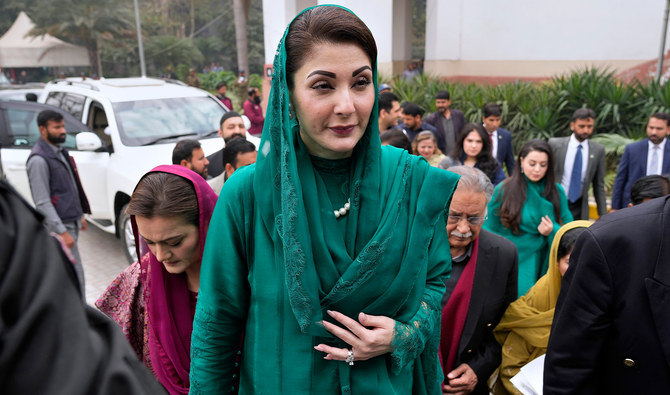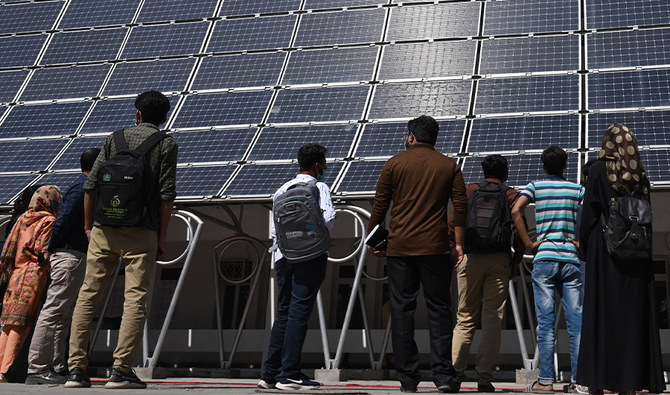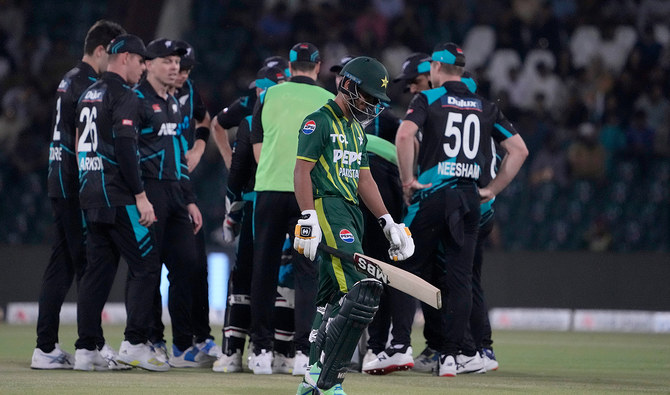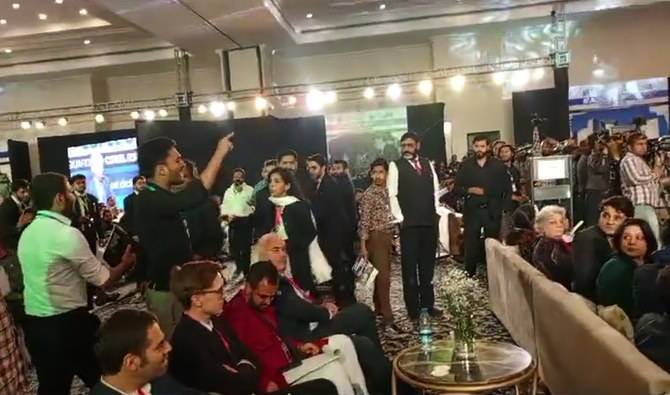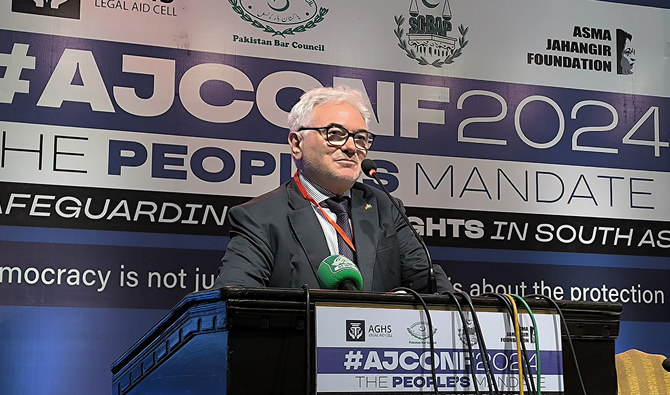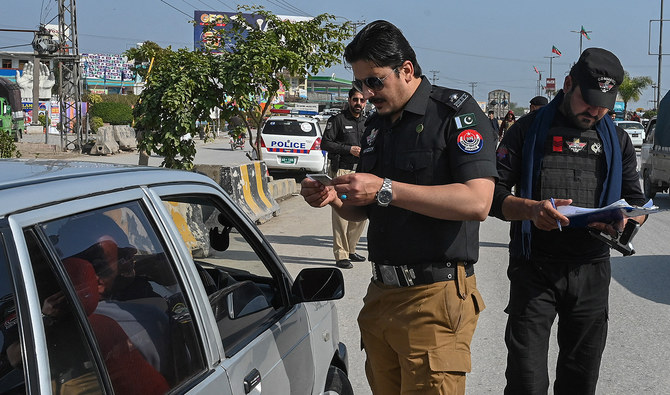ISLAMABAD: Maryam Nawaz Sharif, the daughter of three-time former prime minister Nawaz Sharif, made history on Monday after she was elected as the first woman chief minister of a Pakistani province, Punjab, the country’s most prosperous, populous and politically important region.
The Punjab Assembly’s session, which kicked off at 11:00 a.m. local time, was marred by protests by legislators of the Sunni Ittehad Council, which features members of former prime minister Imran Khan’s Pakistan Tehreek-e-Insaf (PTI) party. SIC legislators had walked out earlier during the day after the party’s nominee for chief minister, Rana Aftab Ahmad Khan, was not allowed to speak by the speaker.
After the counting of votes concluded, Punjab Assembly Speaker Malik Muhammad Ahmad Khan announced that Maryam had polled 220 votes while Aftab did not secure a single vote, as SIC legislators boycotted voting altogether.
“As per the rules of procedure of the provincial assembly of Punjab, Maryam Nawaz Sharif has been declared as the elected chief minister of Punjab,” the speaker said to thunderous applause from the Pakistan Muslim League-Nawaz (PML-N) legislators.
In her first speech as Punjab’s chief minister, Maryam said she was the chief executive for all legislators of the assembly, including those that hadn’t voted for her.
“I have faced numerous hardships, including incarceration in a death cell, but I am grateful to my opponents for providing me with rigorous training to become what I am today,” she said.
“There will be no vendetta against anyone.”
Outlining her agenda for Punjab, Maryam said she would implement her plan to improve people’s lives from her first day in office.
“Provision of jobs, improving health facilities, and solving public issues will start from today, right after this session,” she said.
Maryam assured the assembly that she harbored “zero tolerance” for corruption, vowing to implement an effective governance model that sees the timely completion of projects and delivery of exemplary services to the masses.
Maryam said she would upgrade the province’s basic health units and ensure that every district in Punjab was equipped with a state-of-the-art hospital.
“Medicines will be provided in emergency wards of all government hospital across Punjab,” she said, announcing that her government would launch Pakistan’s first air ambulance service in the province within a few days.
In the Feb. 8 national election, three-time former prime minister Nawaz Sharif’s PML-N won the highest 137 seats in Punjab. The PML-N has been joined by nearly two dozen independent members after the national polls.
The Punjab Assembly is the largest elected house in the country, with 371 seats, comprising 297 general seats and 74 reserved seats, including 66 for women and eight for minorities.
A party requires 186 members to form the government in Punjab.
The province of more than 127 million people, over half of Pakistan’s population, is the heartland of the nation’s political, military and industrial elite. Historically, the party that secures a stronghold in Punjab often manages to form the government at the center.
Last week, the PML-N managed to have its candidates, Malik Ahmed Khan and Zaheer Iqbal Channar, elected as speaker and deputy speaker of the provincial assembly, respectively.
Maryam, 50, plays an influential role in her father’s PML-N party and has been presented by him as his political heir apparent. She is senior vice president of the party.
Prior to entering politics, Maryam was involved with the Sharif family’s philanthropic organizations and served as the chairperson of the Sharif Trust, Sharif Medical City, and Sharif Education Institutes. She formally joined politics in 2012 when she was put in charge of the PML-N’s election campaign ahead of 2013 general elections, which the party won, propelling her father to the prime minister’s office for the third time.
After the elections, she was appointed the Chairperson of the Prime Minister’s Youth Programme, a position from which she resigned in 2014 after her appointment was criticized by political rival Imran Khan over nepotism and her university degree was challenged in the Lahore High Court.
She became more politically active in 2017 after her father was disqualified from the PM’s office and convicted by the Supreme Court of Pakistan in relation to corruption revelations in the Panama Papers. She campaigned for her mother, Kulsoom Nawaz, during by-elections for Sharif’s vacant seat in the NA-120 constituency in Lahore.
Maryam was convicted by an anti-graft court in 2018 and got seven years in jail in a corruption abetment case involving the purchase of high-end apartments in London. Her father was also sentenced to 10 years in prison in the case for not being able to disclose a known source of income for buying the properties. She was also disqualified from contesting in 2018 elections as convicted felons cannot run for office under Pakistani law.
Maryam was acquitted in the case in September 2022, months after Imran Khan was ousted from the PM’s office in a parliamentary vote of no confidence and her uncle Shehbaz Sharif became premier.
Maryam became increasingly involved in politics during her father’s four-year self-imposed exile in the United Kingdom and in 2019, was appointed vice president of the PML-N, leading significant anti-government rallies throughout the country and fiercely denouncing then-PM Khan, his PTI party and the military and judiciary for colluding to oust her father from the PM’s office.
On 3 January 2023, Maryam was appointed senior vice president of the PML-N, making her one of the party’s most senior leaders. She ran for two seats in the Feb. 8 general elections, for the National Assembly seat from NA-119 Lahore-III and for a seat of the Provincial Assembly of Punjab from PP-159 Lahore-XV. This was her first time contesting a general election. She won both seats and was nominated by her party as the candidate for Punjab CM.
Maryam’s candidacy as the first woman chief minister of Pakistan represents a significant milestone, coming over seven decades after Pakistan’s creation. The post is arguably the second most important political appointment in the country, following the prime minister.
Maryam also courted controversy before entering politics.
When she failed to get admission into Lahore’s elite Kinnaird College due to poor academic standing, her father, then chief minister of Punjab, had the principal suspended from duty. A strike by the college students and staff got the principal reinstated.
Maryam later enrolled at Lahore’s King Edward Medical College in the late 1980s but had to leave due to a controversy over illegal admission.
In 1992, she married Safdar Awan at the age of 19, who was serving as a captain in the Pakistan Army at the time and was the security officer of Nawaz Sharif during his then tenure as PM. The couple have three children.



